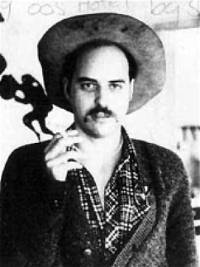Johan van Wyk

Johan van Wyk (1956 – 2022) was born in the small mining town of Welkom, Orange Free State. His father worked on the Cabora Bassa dam and Van Wyk went to schools in Harare, Zimbabwe, and studied language and art history at Wits before taking his doctorate at Rhodes. When in 1976 the Soweto school uprising exploded against mandatory instruction in the Afrikaans language, which also happened to be Van Wyk’s mother tongue, and the revolt was brutally put down by army bullets, some white students at Wits, Van Wyk among them, marched in sympathy demonstrations with black pupils. In a political act more significant than a student march Johan van Wyk modestly admitted to being ‘the first white to refuse to go into the army for political reasons,’ which meant defending the apartheid regime in border wars against ANC guerrillas in Angola, Mozambique and Namibia.
His first English language novel Manbitch, published in 2001, evokes the raw, post-apartheid reality of Durban’s seedy Gillespie Street. It is about the people of the Point Area, in Durban.
The photo book, Trollop slaap te veel, was published belatedly in 2006. He passed away in 2022.
Selected Work
Lewis Nkosi writes: ‘What Johan van Wyk’s fictionalised autobiography reveals is that the effacement of lines that once divided city inhabitants according to race or ethnic origins in turn permits the emergence of new characters in fiction who use the newly deployed space to express new identities, characters who may be black, white or brown, homo-, hetero-, or transexual, but who could never have functioned exactly the same way in the rigidly organized space policed by apartheid race laws. ‘I’m not really sure whether I’m really white anymore,’ Van Wyk tells an interviewer. ‘I’m a South African, a person from the Point or Marine Parade in Durban. I am proud of the way people live together there: rich, poor, white, and the full spectrum of black.”
(Adapted from Lewis Nkosi‘s review Manbitch: The World Of Johan van Wyk.) from ManBitch 2001
I’m looking down from my flat window. The owner of the adult video shop XXX with his steel leg makes his way somewhere. I’ve never seen any customers going in or out of his shop. Carnival sounds (‘I’ll be a bachelor boy till my dying day’) come from the band playing on the veranda of the Four Seasons Hotel and very late at night there are the underworldly sounds of a dog barking from the undercover parking under The Bazaar. Across the street I see the dwarf with the anguished eyes and wild hair of Jesus Christ. He is called Three Quarters. He was born without two arms and a leg. At night the towering Holiday Inn Garden Court throws its blue glow across the city and across my dreaming eyelids in my balcony room. When I returned to my flat on Friday morning the supervisor complained: ‘That girlfriend of yours woke me up at two last night for the key to your flat.’ I found Mbali in the flat. She had her periods. The madness of last week’s alcoholic indulgence ripened into incessant vomiting. In Zulu her name means flower, but she dislikes flowers. Their withering away reminds her of the slipping away of life. Saturday morning she left again. It is Saturday afternoon. There is a roar of cheering from the Four Seasons Hotel: whistles, shouts, hooting, gun shots, crowd orgasms: People are watching soccer on the TV in the Ladies Bar. There was a goal. At the end of the game the hotel erupts and life returns to the streets. I walk to the sidewalk cafe, the Costa do Sol and order a beer. There is not much action. Then I move to the equally desperate Four Seasons veranda with its Indian band playing the favourites of the aging and crippled prostitutes on the dance floor: their clothes as weathered as their wrinkled and toothless faces.
Bibliography
Poetry
1976. Deur die oog van die luiperd. Cape Town: Human and Rousseau Publishers.
1978. Heldedade kom nie dikwels voor nie. Johannesburg: Perskor Publishers.
1981. Bome gaan dood om jou. Cape Town: Human and Rousseau Publishers.
1996. Oe in ‘n kas. Cape Town: Human and Rousseau Publishers.
Literary Criticism
1988. SA in Poesie/ SA in Poetry (Co-editor with Pieter Conradie and Nik Constandaras). Pinetown: Owen Burgess Publishers. Fiction
2001. Manbitch. Durban: A.J. van Wyk.
2006. Manbitch (New Edition). Durban: A.J. van Wyk.